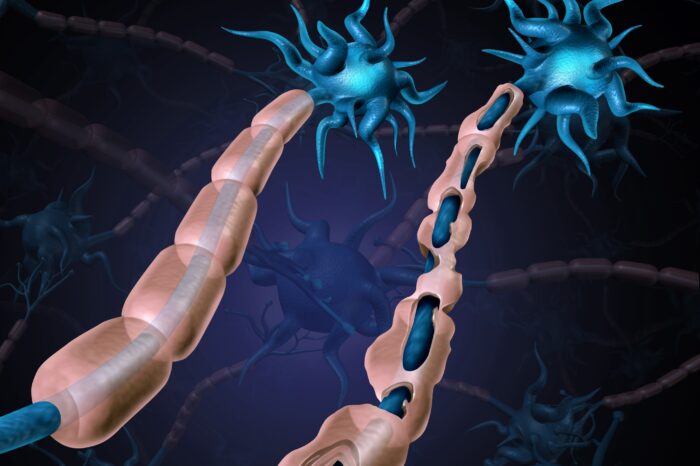Healthy brains suppress inappropriate immune responses
Harnessing this process may offer therapies for neuroinflammatory diseases such as MS, mouse study suggests
 Getty Images
Getty ImagesResearchers at WashU Medicine have found a process by which the brain guards against attack by the immune system. In mice with multiple sclerosis, such "guardian" proteins that train the immune system were drastically depleted, and replenishing them improved symptoms, according to a study in Nature.
The brain constantly engages in dialogue with the body’s immune system. Such communication appears aimed at ensuring a delicate balance between defending against injury and infection and guarding healthy tissue.
Now, scientists at Washington University School of Medicine in St. Louis have revealed how the two strike a healthy balance. The study, in mice, found that fragments of immune-stimulating proteins – dubbed guardian peptides – are produced by the brain and spinal cord of the central nervous system to maintain the brain’s immune balance and permit a healthy interchange of information with the immune system.
The study, published Oct. 30 in the journal Nature, has the potential to improve treatments for diseases, such as multiple sclerosis (MS) and Alzheimer’s disease, among others.
“We have found guardian brain peptides that actively engage with the immune system to keep it in check, possibly preventing destructive immune responses,” said Jonathan Kipnis, PhD, the Alan A. and Edith L. Wolff Distinguished Professor of Pathology & Immunology and a BJC Investigator at WashU Medicine. “We think such peptides help the immune system to maintain a state of ‘immune privilege.’ We are intrigued by the possibility of developing such proteins from healthy brains into a therapy to suppress inappropriate immune responses and develop better disease-modifying therapies for neuroinflammatory diseases.”
Immune surveillance involves a subset of T cells that can initiate an immune response when alerted to a threat. That alert comes in the form of a tiny protein fragment – a sample of the potential threat – displayed on the surface of another group of presenting immune cells. If T cells deem the protein fragment threatening, they mount an attack.
The researchers found that guardian peptides were presented by immune cells at the interface of the brain’s borders, where they attracted and activated a subset of immune T cells whose function is regulatory, such that these cells dampen abnormal immune reactions.
Min Woo Kim, a graduate student in WashU Medicine’s Medical Scientist Training Program and a researcher in the Kipnis lab, examined presenting immune cells from the brain and its associated immune tissues in healthy mice. He found an abundance of brain proteins presented by such cells, with the dominant protein being a component of myelin sheath, the protective cover on neurons that becomes damaged in MS.
The researchers found that in mice with MS, such proteins were drastically depleted. By adding the missing brain-derived peptides through injection of vesicles – membrane-bound compartments – into the cerebrospinal fluid of mice with MS, the scientists found that the therapy activated and expanded a subset of suppressor T cells. Motor function improved, and disease progression slowed in the treated mice compared with mice that received control vesicles.
“We have identified a novel process in the brain where the organ actively engages with the immune system to present a healthy image of itself,” Kim said. “That image looks different in mice with multiple sclerosis. We think that other neuroinflammatory and even neurodegenerative diseases may have unique protein signatures presented to the immune system, opening the exciting possibility of using such signatures as a diagnostic tool for early diagnosis.”
WashU Medicine collaborators on the study include Cheryl Lichti, PhD, an associate professor of pathology & immunology; Clair Crewe, PhD, an assistant professor of cell biology & physiology; Maxim N. Artyomov, PhD, the Alumni Endowed Professor of Pathology & Immunology; and the late Emil R. Unanue, PhD, who died before seeing the study’s completion. Unanue, a 1995 Albert Lasker Basic Medical Research Award winner, was a pioneer in describing the interactions between T cells and presenting cells that make it possible for the former to recognize and respond to foreign invaders.






